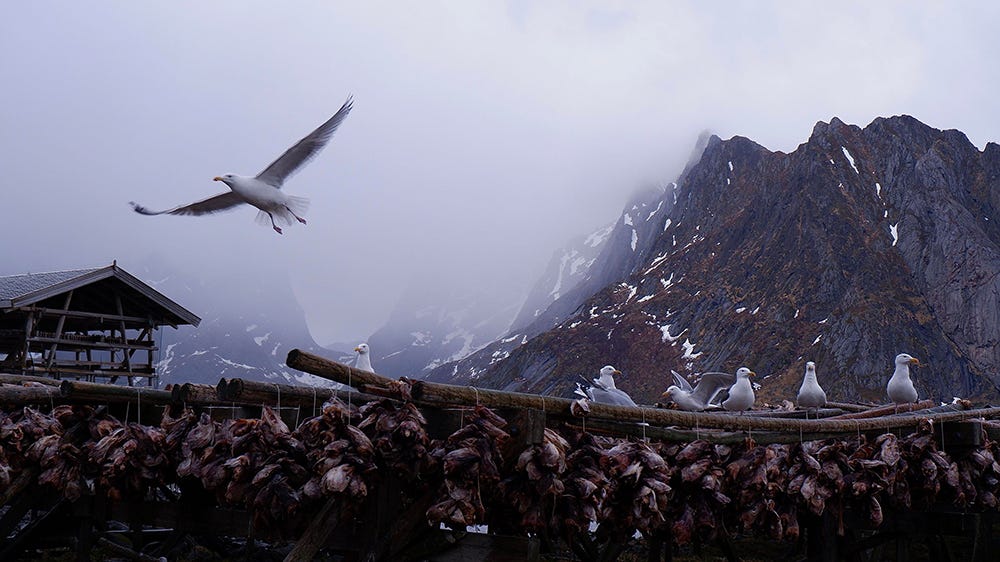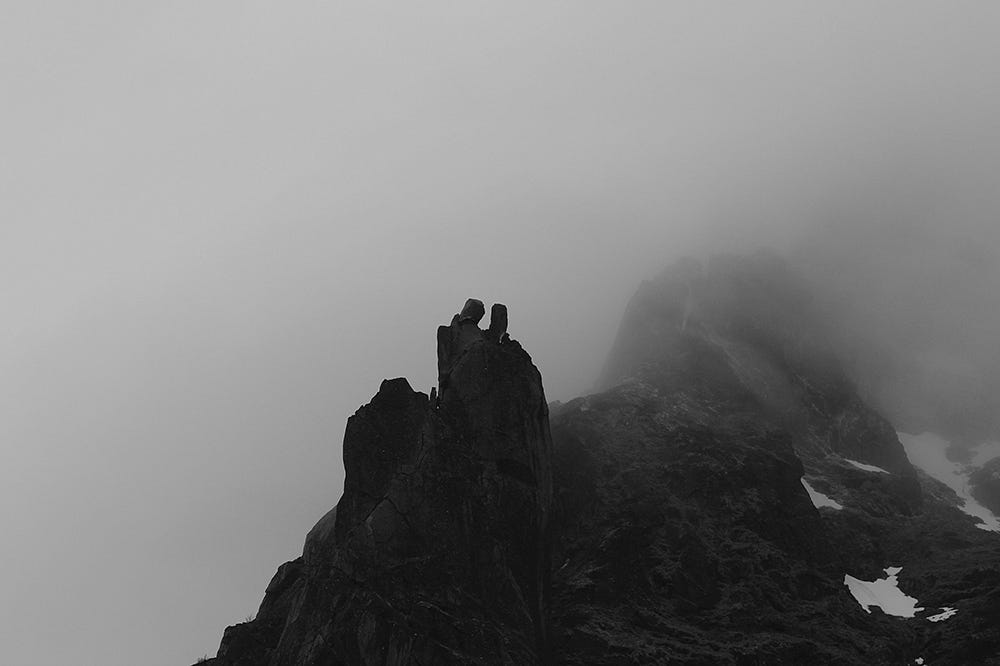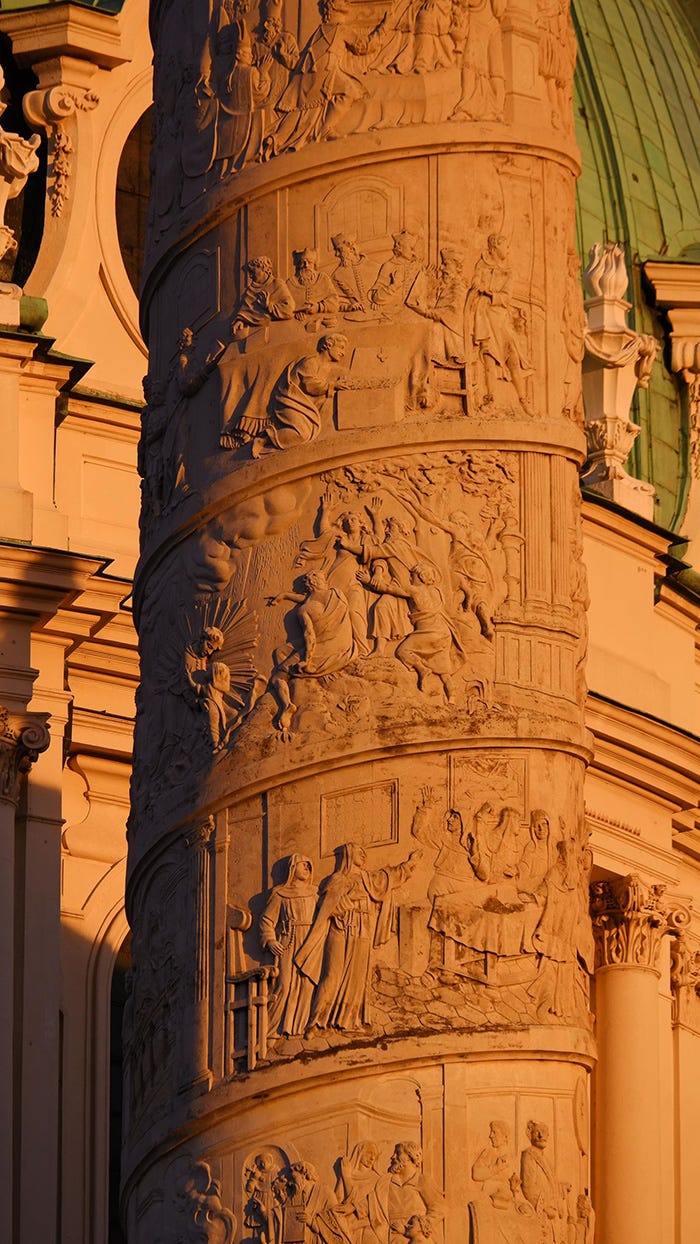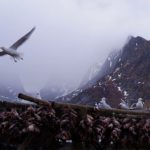April was full of flights. The first came the day after Easter. I left on an early plane from where I live in the North and zipped down to Oslo. This was the first of a four-flight haul from northern Norway to Grand Junction, Colorado. It was not snowing the morning I left, but there was snow everywhere. The good news was the first tjeld had made an appearance along the sund. At least that was the rumor. Chatter on Facebook about the bird’s return, with some folks claiming they heard the bird and others claiming they had seen one, had increased. There would be a scramble to post the first photograph of the bird. The ideal capture would be a tjeld, preferably two of them, sitting on an identifiable rock in front of an identifiable house or naust. In the North, the return of tjeld signals the return of spring. And even the day after Easter, when the entire world may still have been covered under snow, talk of tjelden and their return amounted to promise.

I was on the first flight, and at my feet, I kept a shoulder bag stuffed full of books, drawing paper, a computer, half a dozen pens, power cords, a small electric converter, transplant medication, two journals—one for sketches and the other for scribbles—and a bag of cashews. The flight to Oslo takes around two hours, though sometimes less. I was sleepy, but I managed to pull out one of the books from the shoulder bag. It was a paperback edition of The Half-Finished Heaven Selected Poems by Tomas Tranströmer. From the prose poem “Standing Up,” I read, “It’s been a hard winter, but summer is here and the fields want us to walk upright.” Yes, I thought, exactly that.
The return of birds and the return of spring was an agreeable vision for this trip, aware, as I am, of how April will be a month of deep change in the North. While I am in the States, I know other birds will return. New plants and flowers will join them. The crocus will poke up from thin beds of snow, and the hesterhov will crawl out of muddy tracks. Many of us are well-practiced at reducing our lives to a pile of laundry, but it is a relief when we can glance beyond the icky stains and creases and see the tide change. See the clouds shift. See the river dump blocks of ice into the sea. Miracle though each of these phenomena are, they are not enough to save us. But I ask myself, will a person’s life not be slightly better when he stares out of his pile and sees real dirt or last year’s leaves? To do so is not a cure, I understand, but can’t we at least lean into gifts that nearly predate the world—like wind, like a wash of sunlight? Back in England in March, I read an Oscar Wilde quote made up into word art, or whatever we call framed quotes. The quote argues, “With freedom, books, flowers, and the moon, who could not be happy?” I wondered about this. Mr. Wilde died a very unhappy man, stricken by alcoholism, a broken heart, a broken family, exiled, by court order, from his children, loss of his ability to write, and without a home. There were not enough books, flowers, or moonbeams in his life to return Mr. Wilde to happiness. The earth is not enough, but a heart that closes itself to wonder is a heart alone with itself. Where then do we go?

A curious thing. On the second flight, which was from Oslo to Newark, New Jersey, I rode in proximity to one of the more wretched passengers I’ve encountered in recent years. Mercifully, we did not sit next to each other. She sat in the row across from me, and her husband sat in the seat in front of me. Early in the flight, the wife attempted to sit next to the husband. She sat in the window seat beside him, shifted, smacked her forearms on the armrest, and then announced for all present, “I’m not sitting by the window. It’s too cloudy. I’m not going to see anything!” As if God himself had offended her by creating clouds that morning. How dare God. She dragged herself back to her seat and ordered her husband to remove his jacket. It was too hot, she told him. “You will get too hot. It’s a long flight! You will GET TOOO HOT.” The husband awkwardly stood up and removed his jacket and tucked it into the overhead bin across the aisle. I will guess our couple were in their early seventies. Soon a flight attendant came our way. He was checking seat belts and the comfort of passengers. Yet instantly—and of course this was going to happen—the old woman snipped at the flight attendant. She needed headphones. She needed something to drink.
The flight was not full, not even close to full. Empty seats thrived like lilies in the field. They were free for the picking, and I could easily have changed seats. I also could have nourished my growing enmity for this old woman. Or, as I reminded myself, I could take notes. The old woman was a rare breed of irritating. When I glanced at her, hunched in her seat, she looked like an aged, ill-tempered cat with one paw lifted and pulled close to her chest, offended that anyone should notice her reaching for a last swipe of kibble, hissing, as she did, “I don’t know what’s wrong with the air in here!” The old woman was impossibly real, and I was in awe.
Awe. A grand word awe is. Worth looking up. An admonition, too, that the suddenness with which we can be pulled from our Romances is flabbergasting. We can live in our better worlds. We can sometimes create them. We can believe our hearts and minds are open. But how quickly they get upset. Our efforts towards charity can be disrupted at a glance or with the result of a blood test or the utterances of a politician for whom we mean nothing or by a perceived slight. We surrender our empathy to the mundane, the artificial, the generated, the pundit, the uncouth, and the stupid at a mere word. My theory is we negate the fact that we are going to die. A remarkable aspect of our being is that we are surprised by our own death. This deception is part of how we take risks, part of how we survive. Yes, we know we are going to die, but this is not a lived reality. It may not even be a present reality until late in our own game. What does any of this have to do with a grumpy old woman on an airplane? For as much as I cling to a patch of dirt or a celebration of migratory birds, I too am another Sisyphus forever pushing the stone of my own vanity up an absurd hill. This struggle between our corruptibility and the limitation of our repose is not a happy one.

We are in search of returns. With this search, for some of us, there comes a want for the old words in the old books. “Vanity of vanities, saith the Preacher, vanity of vanities, all is vanity.” Or “Better is an handful with quietness, than both hands full with travail and vexation of the spirit.” Or, from dearest Akhmatova, “I will not give them my songs.” I have scratched these and other quotes in my journal this year. For the moment, my journal is where I have retreated from the old woman. Though reaching again for my shoulder bag, I grabbed a newly purchased collection, A Ted Hughes Bestiary with poems selected by Alice Oswald. I flipped to one of the poems I had already marked, “A Sparrow Hawk,” and read the second stanza, “Through your mulling gaze over haphazard earth/The sun’s cooled carbon wing/Whet’s the eyebeam.” Few poets return us to earth as intensely as Ted Hughes. The sun. The birds. The earth. The plane window out of which I can see.
Into this nest of poetry and words, I eventually fell asleep. No one was beside me, and the old cat napped in her many blankets. When I woke up and looked out of the window, I saw we were flying over Greenland. Flying over Greenland. This is a joy! To see the frozen canyons and river valleys, the blue of the ocean just out from the coast. Even this frozen world will soon be changing. No, I corrected myself. The world is always changing.

What might happen in the North while I am away? Day by day the snow will melt. The rivers near home will swell with runoff. The sun will warm the sea, and the sky will waver between days of rain and days when a pale blue sky will remind everyone that change does come, that something like spring happens even in the North. Some neighbors will clean and oil their bicycles. A few neighbors will restock their RVs for the anticipated summer trip. As soon as the snow recedes from their yards, other neighbors will prepare the ground for potatoes or cull away rhubarb. There will be new strawberry plants to replace the dead ones in the patch. The stores will carry bright, green plants, flowers, and fresh strawberries, along with handsome new suits and dresses and bunad, for the arrival of May 17th, Constitutional Day in Norway. Village life will go on. I hope all of it will go on.
After Greenland came only the sea. I settled back into my seat, trying to decide if I should fall asleep again or maybe read. I told myself that this, too, was an adventure. As I often do in these moments, I found myself thinking about The Wind in the Willows. I am haunted by the book. I thought of the Sea Rat who asks us, as much as he asks the Water Rat, to “heed the call,” to seek the adventure. He reminds us that memories of our old ports, our old doorways, and the stone steps in our ancient cities will stay with us. I will return to the North in a month’s time. There will be snowmelt, runoff, cartons of strawberries. There will be people closer than words. For now, the United States lies ahead. The United States and Newark. Newark, New Jersey. Philip Roth. Frankie Valli. Tony Soprano. And a connecting flight to Denver, God willing.
